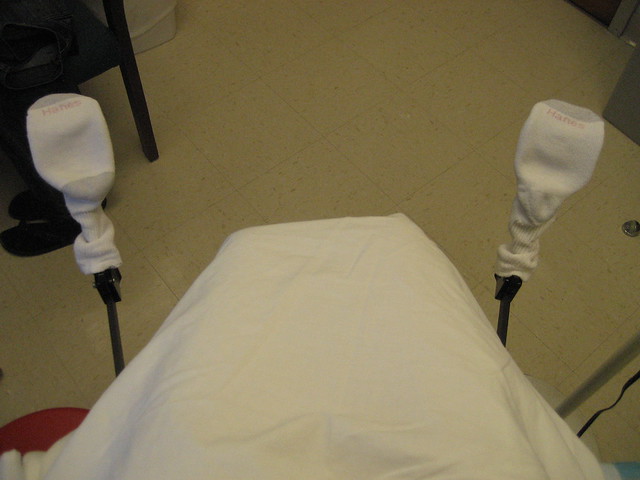I’m a little late with this, but Saturday, December 1, marked the 25th World AIDS Day. On Monday’s Talk of the Nation, I heard that one in five people infected with HIV don’t know they’re infected, and among those aged 13 to 24, 60 percent have no clue. To try to combat these alarming numbers, the Centers for Disease Control and Prevention has drafted a recommendation that doctors include an HIV test among routine exams for patients ages 13 to 64.
Despite the callers who testified about scary experiences with false positives and judgmental doctors, and despite the medical guests’ acknowledgment that members of the most at risk groups don’t see the doctor regularly anyway, I thought this was a fantastic recommendation. Then I thought about what seeing the doctor regularly means these days, even for women who are able to follow the recommended guidelines for physician visits.
When I went to the doctor for my annual well woman exam last month, she informed me the recommended guidelines had changed. The CDC is now telling women ages 21 to 65 who have never had an abnormal pap smear and who haven’t had any new sexual partners in the past year to get a pap smear every three years instead of annually.
My doctor asked me if I still wanted the exam. I went through with it, and as far as I know, my insurance, lame as it is on everything else, still covered it. But after hearing Talk of the Nation, I thought about what those recommendations could mean for women when it comes to stopping the spread of HIV. Women could have had new sexual partners but always used condoms or assumed their partners were “safe,†“clean,†or not the “type†of men they would have to worry about. They could be unmarried and think they’ve been in a monogamous relationship when they’ve been with a cheater. They could have always had normal paps but could be married to a spouse they don’t know has been unfaithful for years, as was the case for a caller on the show. They could have a faithful spouse who was already infected before they got married, like a woman featured in the PBS Frontline documentary, “ENDGAME: AIDS in Black America.†They could be the partner who unknowingly brought HIV into the marriage because they’ve just never been tested. In any of these examples and for any woman, going another three years without being tested for HIV could be fatal for them and for many others.
I’m not counting on monogamy or marriage at puberty becoming the norm anyway soon—even within the latter, polygamy and concubinage has been the standard—so I hope the CDC coordinates its recommendations a little better and this latest recommendation is put into practice. And women, I hope you’re treating yourself well.
My last HIV test was around a year ago. Have you been tested for HIV lately? Ever? Why or why not?


